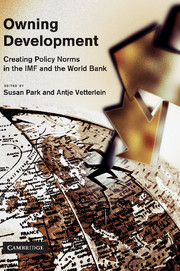Book contents
- Frontmatter
- Contents
- List of figures
- List of tables
- List of contributors
- Preface and acknowledgements
- List of acronyms and abbreviations
- Part One Introduction
- Part Two Norm emergence
- Part Three Norm stabilization
- Part Four Norm subsiding
- 8 The IMF and capital account liberalization: a case of failed norm institutionalization
- 9 The World Bank's global safeguard policy norm?
- 10 The new public management policy norm on the ground: a comparative analysis of the World Bank's experience in Chile and Argentina
- Part Five Conclusion
- Bibliography
- Index
10 - The new public management policy norm on the ground: a comparative analysis of the World Bank's experience in Chile and Argentina
Published online by Cambridge University Press: 02 December 2010
- Frontmatter
- Contents
- List of figures
- List of tables
- List of contributors
- Preface and acknowledgements
- List of acronyms and abbreviations
- Part One Introduction
- Part Two Norm emergence
- Part Three Norm stabilization
- Part Four Norm subsiding
- 8 The IMF and capital account liberalization: a case of failed norm institutionalization
- 9 The World Bank's global safeguard policy norm?
- 10 The new public management policy norm on the ground: a comparative analysis of the World Bank's experience in Chile and Argentina
- Part Five Conclusion
- Bibliography
- Index
Summary
Introduction
Scholars have been dedicated to analysing the changes in the World Bank's discourse in general terms (Miller-Adams 1999; Paloni and Zanardi 2006; Vetterlein 2006) and in particular policy areas (Park 2007b; Stone and Wright 2007; Wade 1996). Other works have focused on the conceptual and theoretical origins of the Bank's discourse (Anders 2005; Crawford 2006). Certainly the World Bank, and the multilateral development banks (MDBs) more broadly, play a key role in international policy networks. This is not just because of their capacity to financially condition states' domestic policies but also because of their role as diffusers of ideas and practices, and as producers of discourse and policy norms.
I analyse to what extent the policy norm that the World Bank has constructed for the modernization of public sector management has led to concrete measures in the programmes and projects of World Bank recipients. Comparing Chile and Argentina, this chapter examines how the World Bank spreads the new public management (NPM) policy norm, which is understood as results-based public management. This policy norm originated outside the World Bank but became an important set of policy recommendations used by the Bank to modernize the state in the context of the Post-Washington Consensus. Nevertheless, an important gap exists between the Bank's NPM policy norm and the reforms that the Bank manages to implement in recipient countries.
- Type
- Chapter
- Information
- Owning DevelopmentCreating Policy Norms in the IMF and the World Bank, pp. 204 - 222Publisher: Cambridge University PressPrint publication year: 2010
- 6
- Cited by

